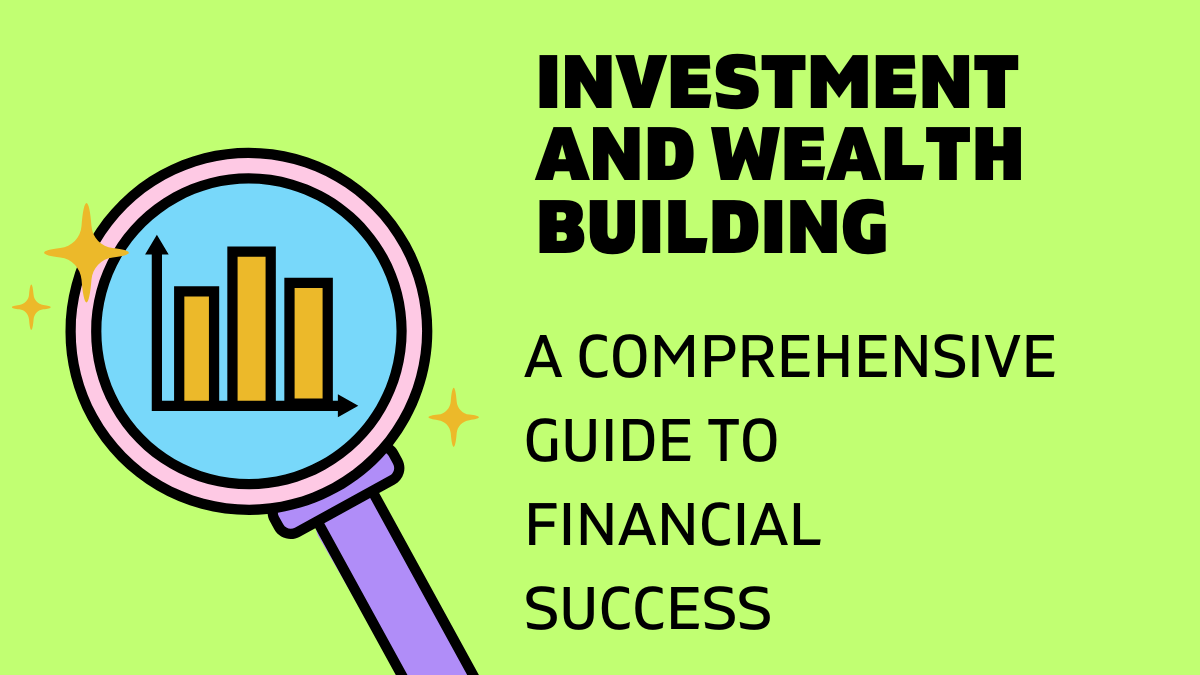Investment and Wealth Building: A Comprehensive Guide to Financial Success
Investing is one of the most effective ways to grow your wealth over time, but it requires knowledge, patience, and a clear strategy. Whether you’re just starting or looking to expand your portfolio, this guide will walk you through the essentials of investing and the importance of wealth-building strategies to secure your financial future.
What is Investment?
Investment refers to the process of allocating resources, usually money, in the hopes of generating income or profit over time. Investments can be made in various forms, such as stocks, bonds, real estate, mutual funds, and more. The goal of investing is to grow your wealth by earning returns on your initial capital.
Key Investment Terms You Should Know
- Return on Investment (ROI): A measure of the profitability of an investment.
- Risk: The potential for losing money on an investment.
- Diversification: Spreading investments across various assets to reduce risk.
- Liquidity: The ease with which an investment can be converted into cash.
Why is Investment Important for Wealth Building?
Investment is essential for wealth building because it allows your money to grow over time through the power of compounding. Unlike saving, which typically offers low returns, investing provides the opportunity to generate higher returns, helping you build wealth faster.
Types of Investments
1. Stocks
Investing in stocks means buying shares of a company. When you own stock in a company, you are a partial owner. The value of your investment can increase if the company performs well, and you may also earn dividends.
- Benefits: Potential for high returns.
- Risks: Market volatility can lead to losses.
2. Bonds
Bonds are essentially loans you give to governments or corporations. In return, you receive interest payments over time, and the principal is returned when the bond matures.
- Benefits: Stable income and lower risk compared to stocks.
- Risks: Inflation may reduce the purchasing power of bond returns.
3. Mutual Funds
A mutual fund pools money from multiple investors to invest in a diversified portfolio of stocks, bonds, or other assets. This offers an easy way to diversify without having to manage individual investments.
- Benefits: Diversification and professional management.
- Risks: Fees and market risk.
4. Real Estate
Investing in real estate involves buying property to generate rental income or profit from appreciation in property value.
- Benefits: Long-term growth and passive income.
- Risks: Property values can decline, and real estate can be less liquid than other investments.
5. Cryptocurrency
Cryptocurrency is a digital or virtual currency that uses cryptography for security. While highly speculative, it has gained popularity as an investment option.
- Benefits: Potential for high returns.
- Risks: Extreme volatility and regulatory uncertainty.
Steps to Start Investing
1. Set Financial Goals
Before you start investing, define your financial goals. Do you want to save for retirement, build an emergency fund, or buy a house? Knowing your goals will help you determine the best investment strategy for you.
2. Assess Your Risk Tolerance
Every investment comes with risk. Your risk tolerance is your ability to handle losses in your investments. Generally, younger investors can afford to take on more risk, while those nearing retirement may want to focus on more stable investments.
3. Diversify Your Portfolio
Diversification helps reduce risk by spreading your investments across different asset classes. A diversified portfolio might include a mix of stocks, bonds, and real estate, depending on your risk tolerance and goals.
4. Start Small and Gradually Increase Investments
If you’re new to investing, start small and increase your investments over time as you become more comfortable. You can begin by investing in mutual funds or exchange-traded funds (ETFs) that offer exposure to a broad market.
Wealth-Building Strategies
Building wealth is about more than just investing. It requires a holistic approach that includes saving, managing debt, and protecting your assets.
1. Save Before You Invest
Before investing, ensure you have an emergency fund with at least three to six months of living expenses. This safety net will protect you in case of unexpected financial challenges.
2. Compound Interest: The Power of Time
The earlier you start investing, the more time your money has to grow through compounding. Even small amounts can grow significantly over time, making a strong case for starting early.
3. Automate Your Investments
Consider automating your investments by setting up a system where a fixed amount of money is invested regularly, such as through a retirement account or savings plan. This ensures consistent investment growth and reduces the temptation to spend.
4. Minimize Debt
High-interest debt can erode your wealth-building efforts. Focus on paying off high-interest debt like credit cards before investing more aggressively. Once you’re debt-free, you can allocate more money toward building wealth.
5. Protect Your Wealth
Wealth building also involves protecting what you have. Ensure you have the right insurance policies in place, including health, life, and property insurance. Additionally, consider estate planning to protect your assets for future generations.
Common Investment Mistakes to Avoid
1. Trying to Time the Market
Trying to predict when the market will rise or fall is a common mistake that can lead to significant losses. Instead, focus on long-term investing and staying committed to your strategy.
2. Lack of Diversification
Investing all your money in one asset class or stock is risky. Diversification helps spread risk and can improve your chances of long-term success.
3. Neglecting to Rebalance Your Portfolio
As market conditions change, the balance of your investments may shift. Regularly rebalancing your portfolio ensures that it remains aligned with your risk tolerance and financial goals.
How to Stay Informed About Investments
1. Follow Financial News
Stay updated on financial news by following reputable sources like Bloomberg, CNBC, and The Wall Street Journal. Understanding market trends can help you make informed investment decisions.
2. Use Investment Tools and Apps
Numerous tools and apps can help you track your investments and manage your portfolio. Popular apps include Robinhood, E*TRADE, and Betterment, which provide a range of investment management services.
3. Consult with a Financial Advisor
If you’re unsure about how to start or improve your investment strategy, consulting with a certified financial advisor can provide valuable insights and personalized recommendations.
FAQs on Investment and Wealth Building
1. How much money do I need to start investing?
You can start investing with as little as $100. Many apps and brokerages offer low minimum investments, allowing you to begin building wealth at any budget.
2. What is the difference between stocks and bonds?
Stocks represent ownership in a company, while bonds are loans made to a company or government. Stocks offer higher potential returns but come with higher risk, while bonds provide more stability but lower returns.
3. What is diversification in investing?
Diversification is the practice of spreading your investments across different asset classes (such as stocks, bonds, and real estate) to reduce risk and improve your chances of long-term success.
4. How often should I check my investment portfolio?
It’s a good idea to review your portfolio at least once a quarter. However, avoid over-monitoring your investments as short-term market fluctuations are normal.
5. How can I minimize the risk in my investment portfolio?
You can minimize risk by diversifying your portfolio, choosing investments that match your risk tolerance, and avoiding speculative or high-risk investments.
6. What is compounding, and why is it important?
Compounding is the process of earning returns on both your initial investment and the interest or returns generated. Over time, compounding accelerates wealth growth, making it a critical factor in long-term investing.
In Sort
Investment and wealth building are essential steps toward achieving financial independence and securing your future. By understanding the different types of investments, following a strategic plan, and avoiding common mistakes, you can grow your wealth and achieve financial success.

